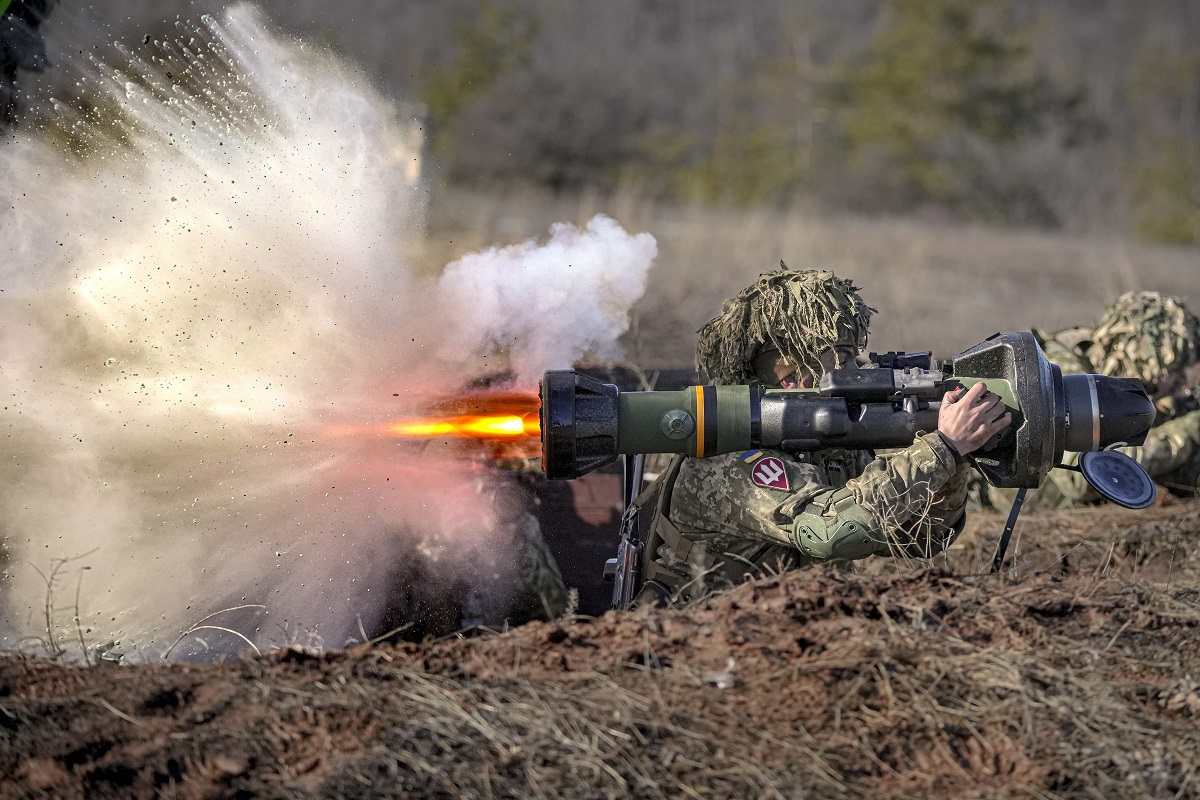Watchdog: Western Arms Companies Failed to Ramp Up Production Capacity in 2022 Due to Ukraine War

A Ukrainian serviceman fires an NLAW anti-tank weapon during an exercise in the Joint Forces Operation, in the Donetsk region, eastern Ukraine, Feb. 15, 2022.
11:57 JST, December 4, 2023
STOCKHOLM (AP) — Many Western arms companies failed to ramp up production in 2022 despite a strong increase in demand for weapons and military equipment, a watchdog group said Monday, adding that labor shortages, soaring costs and supply chain disruptions had been exacerbated by Russia’s invasion of Ukraine.
In its Top 100 of such firms, the Stockholm International Peace Research Institute, or SIPRI, said the arms revenue of the world’s largest arms-producing and military services companies last year stood at $597 billion — a 3.5% drop from 2021.
“Many arms companies faced obstacles in adjusting to production for high-intensity warfare,” said Lucie Béraud-Sudreau, director of the independent institute’s Military Expenditure and Arms Production Program.
SIPRI said the revenues of the 42 U.S. companies on the list — accounting for 51% of total arms sales — fell by 7.9% to $302 billion in 2022. Of those, 32 recorded a fall in year-on-year arms revenue, most of them citing ongoing supply chain issues and labor shortages stemming from the COVID-19 pandemic.
Nan Tian, a senior researcher with SIPRI, said that “we are beginning to see an influx of new orders linked to the war in Ukraine.”
He cited some major U.S. companies, including Lockheed Martin and Raytheon Technologies, and said that because of “existing order backlogs and difficulties in ramping up production capacity, the revenue from these orders will probably only be reflected in company accounts in two to three years’ time.”
Companies in Asia and the Middle East saw their arms revenues grow significantly in 2022, the institute said in its assessment, saying it demonstrated “their ability to respond to increased demand within a shorter time frame.” SIPRI singled out Israel and South Korea.
“However, despite the year-on-year drop, the total Top 100 arms revenue was still 14% higher in 2022 than in 2015 — the first year for which SIPRI included Chinese companies in its ranking.
SIPRI also said that countries placed new orders late in the year and the time lag between orders and production meant that the surge in demand was not reflected in these companies’ 2022 revenues.
‘However, new contracts were signed, notably for ammunition, which could be expected to translate into higher revenue in 2023 and beyond,” Béraud-Sudreau said.
"News Services" POPULAR ARTICLE
-

American Playwright Jeremy O. Harris Arrested in Japan on Alleged Drug Smuggling
-

Japan’s Nikkei Stock Average as JGB Yields, Yen Rise on Rate-Hike Bets
-

Japan’s Nikkei Stock Average Licks Wounds after Selloff Sparked by BOJ Hike Bets (UPDATE 1)
-

Japan’s Nikkei Stock Average Buoyed by Stable Yen; SoftBank’s Slide Caps Gains (UPDATE 1)
-

Japanese Bond Yields Zoom, Stocks Slide as Rate Hike Looms
JN ACCESS RANKING
-

Keidanren Chairman Yoshinobu Tsutsui Visits Kashiwazaki-Kariwa Nuclear Power Plant; Inspects New Emergency Safety System
-

Imports of Rare Earths from China Facing Delays, May Be Caused by Deterioration of Japan-China Relations
-

University of Tokyo Professor Discusses Japanese Economic Security in Interview Ahead of Forum
-

Japan Pulls out of Vietnam Nuclear Project, Complicating Hanoi’s Power Plans
-

Govt Aims to Expand NISA Program Lineup, Abolish Age Restriction























